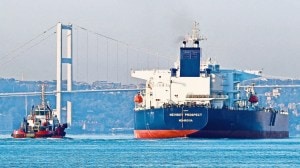Economic bills to be pushed through soon — Sinha
NEW DELHI, OCT 14: The government will push through major economic bills including those on insurance and foreign exchange and float a co...

NEW DELHI, OCT 14: The government will push through major economic bills including those on insurance and foreign exchange and float a comprehensive paper on second generation reforms during the winter session of Parliament, Finance Minister Yashwant Sinha said today.
Listing immediate priorities of the NDA government, Sinha told reporters that fiscal consolidation was a major area of concern and government will prune expenditure in the next five months to control the burgeoning fiscal deficit.
"There are several pending economic legislations which we want to introduce in winter session of Parliament,” Sinha said soon after assuming office along with his junior minister Dhananjay Kumar.
Indicating that the much-delayed second generation reforms, considered to be the road map to put India on a high growth path of 8 to 9 per cent, will be floated in Parliament, Sinha said it will focus on major sectors like infrastructure, financial and industrial besides chalking out a competition policy.
The second generation reform will also aim at sequencing the liberalisation process as the 1991 reforms tended to be a little adhoc’ as it was launched at a time when the country was confronted with an economic crisis, he said.
"We want to put reforms on a path that is quite clearly defined,” Sinha said adding fiscal consolidation during the next five months would be the main task in the wake of directives from the Prime Minister Atal Bihari Vajpayee.
Sinha said mid-year review of the economy will be undertaken soon to enable government present the supplementary demand for grants in the winter session of Parliament. He, however, ruled out any mid-term fiscal correction and said the attempt will be to keep fiscal deficit at the targetted level of four per cent of GDP. Though economic fundamentals are strong, fiscal deficits of both centre and states have been quite high and cause for concern’, he said.
Despite Kargil operations, Sinha said it went to the government’s credit that prices, which usually tend to rise during war-like situations, were kept under check and inflation rate was brought down to a 20 year low of less than two per cent. "It will be our endeavour to keep prices under check," he said adding it would however not be kept low by compressing expenditure as it would affect development.
Justifying the hike in diesel prices, Sinha said this was necessitated due to the steep hike in international prices, which had gone up substantially in recent months. It would not have been prudent to keep the diesel prices low as otherwise oil pool deficit would have widened with serious fiscal ramifications.
Sinha parried a question on whether LPG prices too would be hiked in the wake of increase in international prices saying the matter will be looked into later. On implementation of Verma panel recommendations on weak banks, Sinha said the main thrust of banking sector reforms would be on the basis of Narasimham committee recommendations.
Many of the recommendations of the Narasimham committee have been implemented and the remaining would be considered in course of time, he added. Replying to a question if the downsizing of government has taken a beating with the induction of jumbo ministry, Sinha said it was well within the limits suggested by the Sarkaria commission. Sarkaria commission had recommended that the ministry should not be more than ten per cent of the total number of members of both houses of parliament, Sinha said adding Lok Sabha and Rajya Sabha had together about 800 members and a 70-member Vajpayee cabinet was well under this stipulation.
On lowering of interest rates in the wake of low inflation, Sinha said this issue was the domain of the Reserve Bank and it is upto it to look into the matter. Fiscal consolidation is the finance ministry’s responsibility and he was confident that the government would create right conditions to enable RBI to carryout its priorities.
FIPB to be abolished
NEW DELHI: The industry and commerce minister Murasoli Maran has hinted that the list of industries where automatic permission is given by the government to set up units may have to be enlarged in order to attract more foreign direct investment in the country.
Alternatively, consideration would have to be given to draw up a negative list of industries, which would not be open to foreign investors, said Maran while speaking to a group of reporters immediately after assuming office.
Maran, who had been able to bring the high-powered Foreign Investment Promotion Board (FIPB) functioning in the Prime Minister’s Office under his charge during his brief stint as industry minister in the UF government in 1997, raised doubts whether it should be part of his ministry.
"The FIPB has become automatic since its inception in 1991-92.It meets every Saturday to dispose of FDI cases and its functions should therefore be carried out by somebody", he felt.
"Our estimate is that India can absorb FDI to the extent of 10 per cent of the GDP annually", he said adding that this point had been emphasised in the NDA manifesto.



- 01
- 02
- 03
- 04
- 05




























